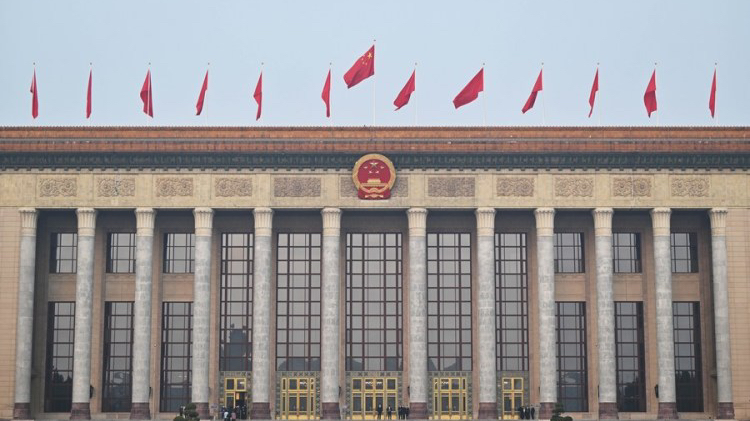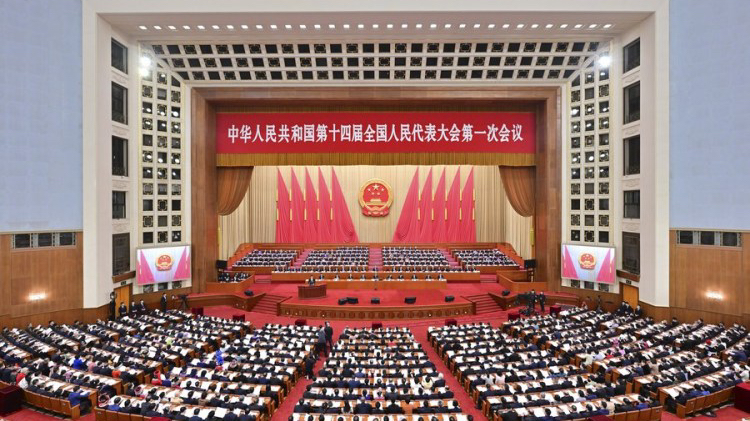
The Great Hall of the People in Beijing, capital of China, March 5, 2023. /Xinhua
The Great Hall of the People in Beijing, capital of China, March 5, 2023. /Xinhua
Editor's note: John Gong is a professor at the University of International Business and Economics (UIIBE) and VP- Research and Strategy at the UIBE-Israel. The article reflects the author's opinions and not necessarily the views of CGTN.
One of the focal points of this year's Two Sessions has been the State Council's announcement of a sweeping reorganization that involves an across-the-board five percent personnel cut among state institutions at the central level, the formation of a central government financial regulatory body, and most importantly in my view, the revamp of the science and technology ministry, amidst a couple of other minor organizational adjustments.
This is actually the ninth reorganization at the State Council since the reform and opening-up. The past eight times happened respectively in 1982, 1988, 1993, 1998, 2003, 2008, 2013 and 2018. It appears that reorganization was typically in order every five years or so. Looking back, a consistent theme motivating these organizational realignments at the highest level of the government in China is mostly about governance efficiency and in accordance with stages of economic development over time.
This time around is no exception, as the government says the primary purpose is functional optimization and adjustment at organizations in areas of focus. What are these areas of focus? Clearly they point to science and technology, financial regulation and intellectual property right protection among other things.
The reorganization of Ministry of Science and Technology is of particular interest. First, we will have a much smaller ministry that is not going to get into the nitty-gritty of innovation program fund allocation and management decision making processes. The ministry will play more of a central planning and policy guidance role as opposed to the implementation role as done in the past. In other words, the dichotomy between the macro and micro role will be clearer, the latter of which the ministry is supposed to get out of. There has been some criticism in the past that the ministry gets too much involved in program and project level matters in the sense of being both a referee and a competing athlete. That needs to change.

The second plenary meeting of the first session of the 14th National People's Congress (NPC) is held at the Great Hall of the People in Beijing, capital of China, March 7, 2023. /Xinhua
The second plenary meeting of the first session of the 14th National People's Congress (NPC) is held at the Great Hall of the People in Beijing, capital of China, March 7, 2023. /Xinhua
Second, some technology development functions within the ministry will be transferred to other sectorial ministries such as the Ministry of Agriculture and Rural Affairs, the Ministry of Industry and Information Technology, the Ministry of Human Resources and Social Security etc. The underlying logic behind this is that these ministries know better their respective sectors and research funding in these sectors will be better handled by these ministries.
Third, a central science and technology commission will be established, with Ministry of Science and Technology acting as its administrative wing, according to Xiao Jie, the secretary-general of the State Council. This is a significant development in that science and technology has become an important area of focus within the Communist Party of China.
After this round of reorganization, Ministry of Science and Technology will be much smaller and leaner, but more efficient. Its function within the ranks of the ministries under the State Council is obviously much more important. This reflects the importance of innovation against the backdrop of China's increasingly difficult development environment internationally. The United States has essentially adopted a technology boycott against China that it is billed as "competition." The country is forced to respond with a strategy of wholesale indigenous technology development. The role of the ministry has become ever more important.
Finally, it is worth mentioning the State Council's goal of cutting five percent personnel across the board. A smaller government is always welcome, as it tends to be more conducive to a bigger society.
(If you want to contribute and have specific expertise, please contact us at opinions@cgtn.com. Follow @thouse_opinions on Twitter to discover the latest commentaries on CGTN Opinion Section.)